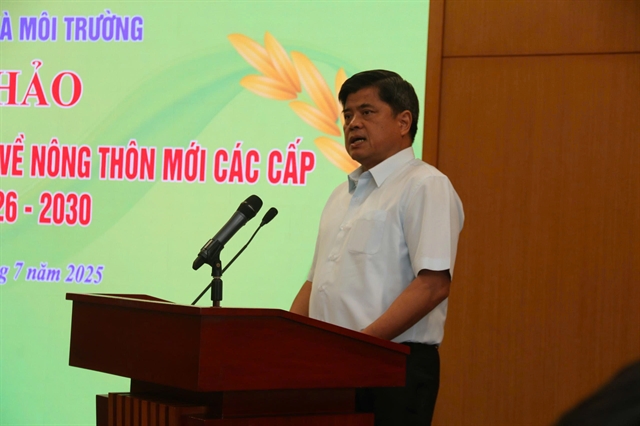 Society
Society


|
| Deputy Minister of Agriculture and Environment Trần Thanh Nam speaks at the workshop. — Photo nongthonmoi.gov.vn |
HÀ NỘI — Việt Nam’s new rural development framework for the 2026–30 period must better reflect ground realities and empower local authorities to take the lead in implementation, Deputy Minister of Agriculture and Environment Trần Thanh Nam said at a consultation workshop in Hà Nội on Friday.
At the event, officials discussed a draft revision of the national criteria for new-style rural communes, which proposes dividing communes into three development groups to better align the standards with local conditions.
Group 1 includes poor and particularly disadvantaged communes in ethnic minority and mountainous areas.
Group 2 covers communes where farmland accounts for at least 70 per cent of the total area.
Group 3 comprises urbanising communes, including those with high population density, merged communes, or localities with minimal agricultural output or urban development orientation.
This classification is expected to help localities adopt more suitable criteria based on their specific circumstances.
The draft proposes nine major categories for commune-level assessment, including planning, infrastructure, rural economy, human resources, culture, environment, governance, science-technology and digital transformation, and access to law and public security.
Deputy Minister Nam noted the criteria were initially developed in late 2024 based on input from ministries and provinces, but they now require revision to reflect administrative restructuring and new development challenges.
Ngô Trường Sơn, Chief of the Central Coordination Office for the National Target Programme on New Rural Development, said the current 2021–25 criteria had proven to be a vital tool for planning and monitoring. More than 95 per cent of communes nationwide have now met seven core criteria such as planning, electricity access, and education.
However, income, poverty reduction, and environmental protection remain challenging areas.
The updated framework for 2026–30 will include new features such as a modern rural commune category, while removing the rigid model commune label to allow more flexibility. It also proposes stronger decentralisation and improved integration with other national target programmes like the sustainable poverty reduction agenda.
Experts at the workshop stressed the need to clarify the functions of each criteria group.
Assoc. Prof. Dr. Nguyễn Thế Chinh, former Director of the Institute of Strategy and Policy on Natural Resources and Environment, emphasised the importance of clear, consistent environmental standards that align with national strategies and legal frameworks through 2050.
In terms of planning and infrastructure, Doctor, Architect Phạm Thị Nhâm from the Ministry of Construction said criteria should help shape quality living spaces, support agricultural production, and respond to modern trends such as urbanisation, digitalisation, and climate change.
Participants also suggested incorporating new metrics such as a happiness index and smart village indicators.
Deputy Minister Nam affirmed that all feedback would contribute to finalising a more adaptive and inclusive set of criteria for the coming phase of the New Rural Development Programme. — VNS